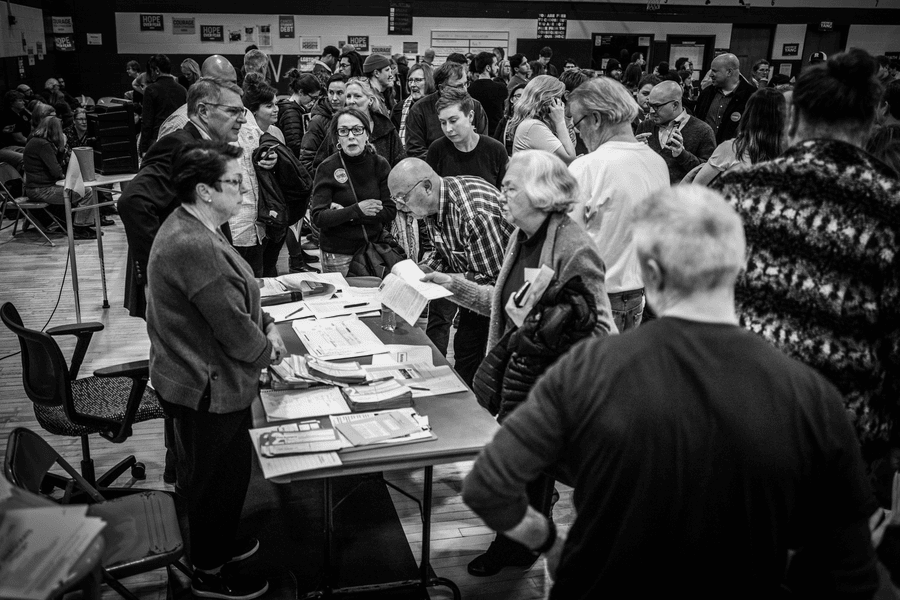Trump's Tweets Attacking the Election Echo Russian Trolls
Tweets from Trump and his inner circle show how close the Trump campaign is in tone and style to Russian disinformation. This type of disinformation poses huge challenges for U.S. democracy, and for the Republican Party.

Published by The Lawfare Institute
in Cooperation With

Just after midnight following Election Day, a Trump-supporting Twitter account, @pamela_moore13, shot off a series of tweets. “This is Madness! Voter Fraud Also Caught on Tape in Philadelphia! #ElectionNight” followed by “BREAKING! More EXTENSIVE Broward Country Voter Fraud Reported By Elections Worker!” and then “Van Full of Illegals Shows Up To Vote . . . At SIX Polling Places! Voter Fraud is Real! #ElectionNight.”
Were these just more complaints from disgruntled Trump supporters after the 2020 election? Nope. They were actually posted after the 2016 election, not by real-life Trump supporters in Pennsylvania or Nevada, but identified by Twitter as being sent by Russian agents typing from keyboards in St. Petersburg.
The Russian disinformation campaigns that cropped up on social media in 2016—and continued into 2020—have used deception to drive wedges between ideological and cultural groups in America, often warning each side that the other was out to destroy them by any means necessary. Their messages destabilize our system, make it more difficult for us to govern, and make their own system appear stronger and more legitimate in comparison.
But this isn’t another piece about disinformation out of Russia. It’s a piece about the president of the United States.
Since November 2020’s election, tweets from Trump and his inner circle show how close the Trump campaign is in tone and style to Russian disinformation—@DonaldJTrumpJr, “Ever notice the “glitches” only go one way?” Yet the current campaign by the president and his allies is different in one important way: total impact. The president has brought disinformation to an audience that the IRA could only dream of. In the week following Election Day, the hashtag #StopTheSteal was used more than 1.5 million times on Twitter. Russian disinformation operations have shown some success, but Trump’s campaign has been in an entirely different league in terms of impact. The aftershock of Russian disinformation operations in 2016 strained some Americans’ trust in the electoral process. Here, the president—armed with baseless conspiracies about voter fraud—is challenging that trust like never before. No need for Russian trolls; this damage is completely self-inflicted.
Russian disinformation campaigns tried for years to help shape entirely divergent realities for different groups of Americans, hoping to create incompatible realities and groups incapable of compromise. They did so by pulling on the emotions of real Americans to convince them of ideas they were already inclined to believe. As recently as March, accounts we identified as Russian-affiliated were chipping away at America’s trust in fair and free elections with tweets such as that from @DannyMichigan, “I personally believe the driving motive behind the Russia hoax and other diversionary scams by Democrats is to camouflage their campaign of massive voter fraud. Illegal immigrants, dead voters, and their new tactic of “vote harvesting” are suffocating our democracy.” President Trump’s current campaign strategy doubles down on these same efforts and is pulling his followers more and more away from a reality based on shared facts. The president has called 2020 the “most INACCURATE & FRAUDULENT Election in history.” This is plainly not true: Experts in his own Department of Homeland Security called the election “the most secure in American history.”
Glaringly different online ecosystems translate to tangible differences in public opinion. Take, for example, a recent Monmouth University poll in which 99 percent of Biden voters believed he won the election “fair and square” while only 11 percent of Trump voters believed the same. One member of the Michigan State Board of Canvassers refused to certify that state’s election results, abstaining on a vote that is normally pro forma. If one believes the president’s lies, one may think it’s worth upending the nation’s electoral system.
There is growing evidence, however, that perpetrators of the conspiracy themselves don’t believe the hype. The voter fraud campaign is, in other words, not just misinformation but disinformation—false information distributed to deceive. When Trump’s allies speak in contexts where lies are punishable by criminal sanction, they don’t appear eager to peddle conspiracies about voter fraud. So far, President Trump’s legal campaign has focused on procedural issues and has hesitated to make actual claims of fraud in court.
Many researchers and experts have downplayed Russian attempts to influence U.S. elections. It is easy to view Russian efforts as contemptible, but also ineffectual. Russian disinformation is, after all, relatively small fish in a sea of media. Russian disinformation has always faced an uphill challenge; they must first build their legitimacy before influencing others. On the right, past Russian influence accounts such as @TEN_GOP have pretended to be the voice of the Tennessee Republican Party while on the left @BlackMattersUS built a following acting the part of a Black Lives Matter advocacy organization. Such efforts gathered tens of thousands of followers but always faced inherent hurdles posed by anonymity.
Unlike @TEN_GOP, @realDonaldTrump is the real deal, the voice of the sitting president of the United States. The president wields a tool of influence the Russians have always desired, making his attempts to undermine election integrity far more dangerous and potentially costly. Legitimacy is a powerful tool the Russians sought but never truly had. Whatever role, if any, Russia played in getting us to this point, it can now spike the ball and go home.
President Trump’s campaign against election integrity convinces many people of things not in their best interest. His attacks not only have dire implications for our experiment with democracy; they may also have negative consequences for the future of the Republican Party, consequences the president’s current enablers should consider.
Research shows that people who believe electoral malpractice is common are significantly less likely to vote. Worried about voter turnout in the face of the pandemic, Republican Party operatives voiced concern to the Washington Post prior to the election that President Trump’s attacks on mail would have this very effect. The core of the Republican base is currently being convinced by some of their own leadership that elections are fraudulent. If these beliefs stick, they may impact future elections by lowering voter turnout on the right. The party may be cutting off its nose to spite its face, all to maintain President Trump’s brand loyalty.
In this case, what is bad for Republicans is bad for the country. Two healthy parties, both grounded in reality, are needed for national politics to heal. As the country moves into a long delayed official transition process, a Biden presidency is just around the corner. But in the meantime, the lameduck president’s unending barrage of tweets—and the complicity of prominent Republicans—is doing increasing damage both to the nation and to the future health of the Republican Party.




.jpg?sfvrsn=d8787e74_5)

